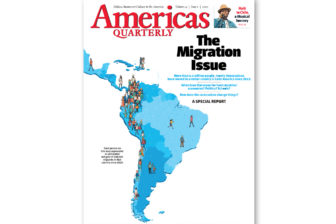This article is adapted from AQ’s special report on migration
LIMA — Official data on key health indicators in Venezuela have been scarce or nonexistent for years. But information from international agencies and neighboring countries suggests that Venezuela’s health care system has long since collapsed.
The implications for other countries in the region — especially those receiving large numbers of Venezuelan migrants at their borders — are significant.
According to a 2019 report by the Organization of American States, Venezuelan hospitals lacked between 80% and 90% of essential medicines and surgical materials. More than half the country’s operating rooms were out of use and more than two-thirds of public emergency rooms were only intermittently operating. Perhaps most significantly for Venezuela’s neighbors, long-running vaccination programs have been disrupted.
The breakdown of these programs has led to the reappearance of vaccine-preventable infections that had been well-controlled for decades, including tuberculosis, hepatitis A, whooping cough and diphtheria, as well as malaria and dengue, and STDs including HIV/AIDS.
Recent outbreaks of measles and the spread of coronavirus in the region offer two clear illustrations of the risks. According to a 2019 study conducted by researchers at the Johns Hopkins Bloomberg School of Public Health, Venezuela reported more than 7,000 measles cases from 2017 to mid-2018. That led to the emergence of measles in Colombia, where 98% of reported cases were shown to have been imported or related to other imported cases. The Pan American Health Organization estimates about 80% of confirmed cases of measles throughout the Americas in 2017 came from Venezuela. Diseases don’t recognize international borders. But they spread faster — and are harder to control — in the context of large-scale migration.
Meanwhile, policies aimed at restricting migration appear ineffective. Recent limits on legal migration, including border closures related to the coronavirus outbreak, have pushed more Venezuelans to migrate irregularly, undermining best practices such as vaccination programs at official border crossings. Life for migrants in countries under lockdown is often fraught. Venezuelans in Peru, for example, are unable to access government services intended to help people live through the coronavirus quarantine, meaning food and other essentials can be hard to come by.
Some countries, such as Colombia, have taken a proactive stance.
Doctors in Colombian border cities such as Cúcuta are treating not only cancer and AIDS, but also preventable diseases such as diphtheria, measles and malaria. The Colombian government has invested $50 million in reproductive, sexual and mental health programs for Venezuelan immigrants, and has worked with international partners to include Venezuelans in its coronavirus treatment plans.
But border cities’ hospitals have already been severely strained. According to Felipe Muñoz, adviser to Colombia’s president on issues related to the Venezuelan border, the national government owes regional hospitals $90 million for costs related to emergencies and births of Venezuelans, without taking into account potential costs from coronavirus.
This crisis is not going away. Latin America needs significantly more international help both in funding and in technical know-how regarding emergency response and how to best structure the efficient disbursement of funds from national to regional governments. In mid-2019, the United Nations High Commissioner for Refugees and the International Organization for Migration reported receiving only 25% of funds needed to support aid efforts associated with Venezuelan displacement. The continued lack of assistance would be detrimental to public health, not just in the Americas but around the world.
—
Freier is an assistant professor and researcher focused on migration issues at Peru’s Universidad del Pacífico









